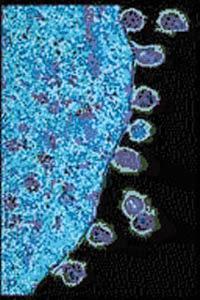Several studies with non-human primates (NHPs) have shown that in -vivo administration of an antibody against the integrin can induce persistent Simian immunodeficiency virus (SIV) control, delay disease progression, and reduce viral titres (Ansari, 2011; Byrareddy, 2014, Byrareddy 2016). The precise mechanism of protection, however, had remained uncertain. α4β7 integrin serves as a gut-homing receptor on T cells by interacting on with MAdCAM, present on the surface of gut high endothelial venules. Recently, Guzzo et al., (2017) found that α4β7 can be incorporated in HIV virions, thereby facilitating infection of MAdCAM expressing cells and intestinal homing of the virus.
Nawaz et al., now show in this study, that the interaction of MAdCAM with its ligand α4β7, present on the surface of CD4 T cells, costimulates these T cells and thereby promotes HIV replication. Further, stimulation of CD4+ T cells with MAdCAM induced proliferation of α4β7 expressing cells, activated both, naïve and memory CD4+ T cells, and upregulated expression of CCR5. All effects could be blocked by the addition of an anti-α4β7 antibody.
Retinoic acid, which can upregulate α4β7 on naïve T cells, was found to act as an essential cofactor in MAdCAM-induced proliferation and viral replication in naïve CD4 T cells. As the combined presence of MAdCAM and retinoic acid is limited to gut associated lymphoid tissues (GALT), the findings of Nawaz et al., could explain the prominent role of GALT in acute HIV infection. This study thus provides novel insight on how the antibody blocking α4β7 might protect against disease progression SIV infected NHPs by protecting GALT of increased viral replication.
Journal Article: Nawaz et al., 2018. MAdCAM costimulation through Integrin-α4β7 promotes HIV replication. Mucosal Immunology
Article by Kathrin Held











